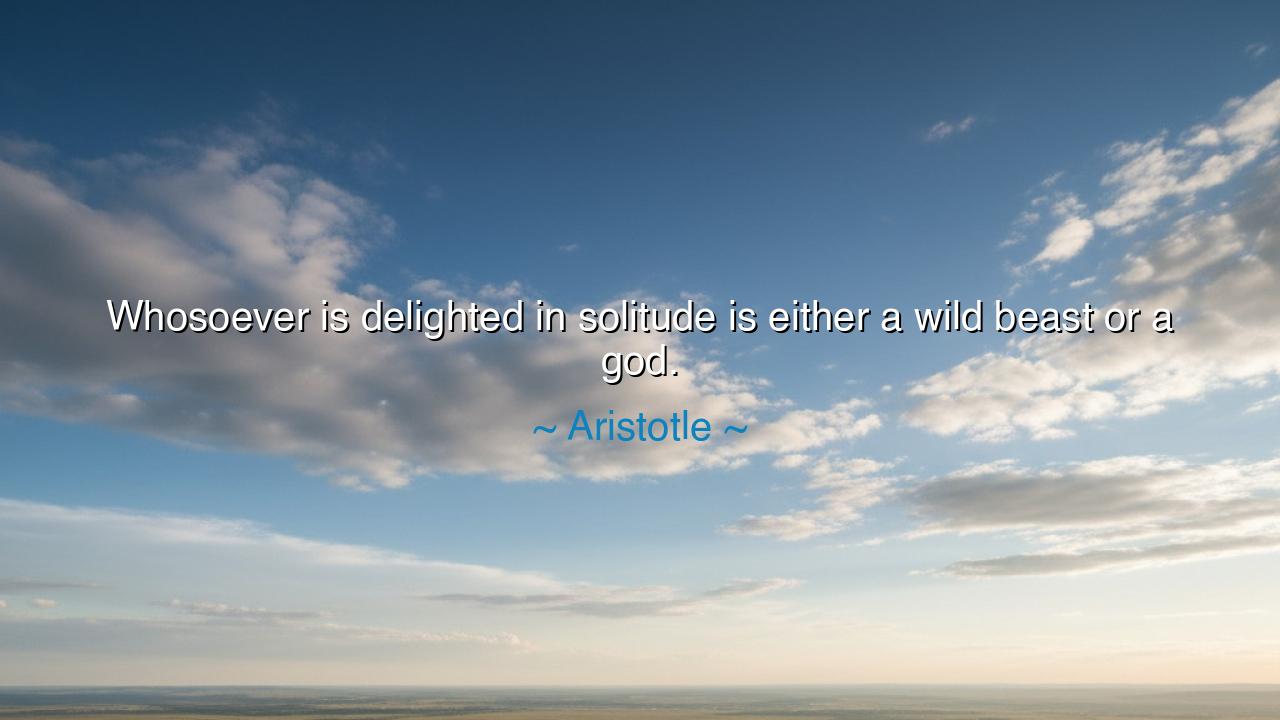
Whosoever is delighted in solitude is either a wild beast or a






“Whosoever is delighted in solitude is either a wild beast or a god.”
So spoke Aristotle, the ancient philosopher whose wisdom has echoed through the halls of time, shaping the minds of generations. In this powerful statement, Aristotle draws a line between the extremes of solitude — a force both primal and divine. He who delights in solitude, he suggests, is not of ordinary measure, for such an inclination is not common among men. It is a state of being that either leads to madness and isolation, or to an elevation of the spirit. The wild beast, untamed and solitary, lives apart from the community, driven only by its base instincts. The god, on the other hand, walks alone not in despair, but in sovereign purpose, knowing the vastness of existence and the silence that accompanies true enlightenment.
In the ancient world, solitude was a crucible for transformation. The great sages and mystics often retreated into the wilderness to seek communion with the divine or to cultivate wisdom far from the distractions of society. But there was always a danger: without purpose, solitude could lead to madness. The wild beast retreats into isolation driven by the instincts of survival and hunger. It does not choose its solitude; it is a prisoner of it. And yet, the god retreats into solitude by choice, recognizing that the mind and spirit must sometimes be alone to reach their highest potential. Thus, Aristotle’s words are not a condemnation, but a reflection on the nature of the self. To seek solitude is to either transcend or diminish — a state of solitude will shape the soul, for it reveals what lies beneath the surface of the mind.
Consider the life of Diogenes, the ancient philosopher known for his rejection of society’s conventions. He sought solitude not in sadness or escape but in the pursuit of truth. His life was a deliberate retreat from the trappings of society, living in a barrel on the streets of Athens. He was no beast; rather, he was a god in his own right — one who sought to strip away the false layers of human existence to reveal the core of being. In his solitude, Diogenes found freedom. He was not driven by hunger or fear; his retreat was an act of radical self-sufficiency and wisdom. He lived as a god lives — not needing the company of men to know himself.
But let us not forget the perils of excessive solitude, for the soul is not meant to wander alone without guidance. In ancient myth, the tragic tale of Narcissus reveals the dangers of losing oneself in isolation. Narcissus, in his self-absorption, found only himself and was consumed by the reflection of his own image. His solitude became a prison, and he perished within it. Here, the lesson is clear: there is a difference between solitude that enlightens and solitude that entraps. The wild beast does not choose his solitude; it is thrust upon him by nature’s forces, and in it, he perishes. To be delighted in solitude is not to escape from the world, but to discover its depth through reflection and contemplation.
In the time of Socrates, the great philosopher spent much of his life in contemplation and discourse with his fellow citizens. Though he valued solitude, it was not to escape humanity, but to engage with it more deeply. Socrates knew that the true path to wisdom required moments of introspection, but he also knew that wisdom without connection to others is barren. Like Aristotle, Socrates understood that the true power of solitude is in how it transforms the soul, not in how it isolates it from the world. The one who delights in solitude for the sake of growth becomes a god in the sense that he transcends the petty and reaches for the eternal truths that guide mankind.
And yet, we live in an age that has forgotten the balance Aristotle spoke of. We retreat into our minds, into our devices, into our rooms, seeking peace in isolation. But it is not the escape from others that brings peace, it is the ability to transform through solitude that elevates the soul. Solitude is a powerful tool — a tool that reveals the soul's purpose and strength when it is chosen with intention, but a tool that destroys when used to flee from the world’s challenges. Gods are those who retreat into themselves to create — they do not run away from life; they seek it within, to make it their own.
The lesson, therefore, is this: Solitude is not the enemy of life but the test of character. Seek it not as a refuge from the world, but as a place of renewal, a time to reflect on your place within it. Do not hide in the silence out of fear, but enter it to know and grow. In solitude, you may discover your true self — not the self that is shaped by the opinions of others, but the self that stands firm in its own truth. Just as a god retreats to seek clarity, so must you. But remember, as Aristotle teaches, to enjoy solitude is a sacred privilege, and one must tread carefully, for there is always the risk of becoming a wild beast, lost in the wilderness of the mind.
May your solitude, then, be a place of transformation, a place where you are not consumed by the self, but reborn into a deeper connection with the world. Find strength in the silence, but never forget that true growth comes not only in solitude, but in the wisdom shared with the world.






AAdministratorAdministrator
Welcome, honored guests. Please leave a comment, we will respond soon